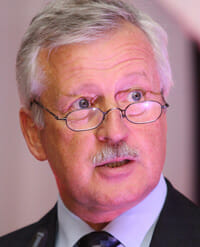
Namibia, Germany N$450 million loan agreement to finance priority roads projects

Namibia and Germany signed a concessional loan agreement of approximately N$450 million to finance priority roads projects in Namibia through the Roads Fund Administration (RFA), which are implemented by the Roads Authority.
German Ambassador to Namibia, Christian Schlaga, Minister of Finance Calle Schlettwein, Chief Executive Officer of the Roads Fund Administration (RFA), Ali Ipinge, Director General for Africa and the Middle East of KfW – German Development Bank, Helmut Gauges, signed the agreements on Financial Cooperation.
The Programme is embedded in the national strategies and objectives of the government aiming at the expansion of transport infrastructure and more specific at the rehabilitation and maintenance of the road network. By providing an interest subsidized loan, Germany will assist the Namibian Government in implementing its Sector Execution Plan and accomplishing the NDP-4 goals.
One specific project funded under the program concerns the Windhoek – Okahandja road rehabilitation and extension. The road has one of the highest accident records in Namibia and is one of the highest traffic sections of Namibia’s road network.
At the signing ceremony held in Windhoek last week, it was emphasized that the road network in Namibia is the backbone of the economy, especially due to the size of the country, which is nearly triple the size of Germany, and the low population density, the national market is very dependent on transport.
Labour-based constructed roads under this programme total more than 1,000km of the new rural roads in the central northern region with total investments of more than 200 million Euros, which are co-financed by the Namibian and the German Government through KfW.
Per 100 km of new roads approximately 1,000 people are employed in the project area and are receiving a temporary income, additionally, a large portion of construction work is contracted to SMEs using labour-based methods instead of machinery.
Caption: German Ambassador to Namibia, Christian Schlaga









































